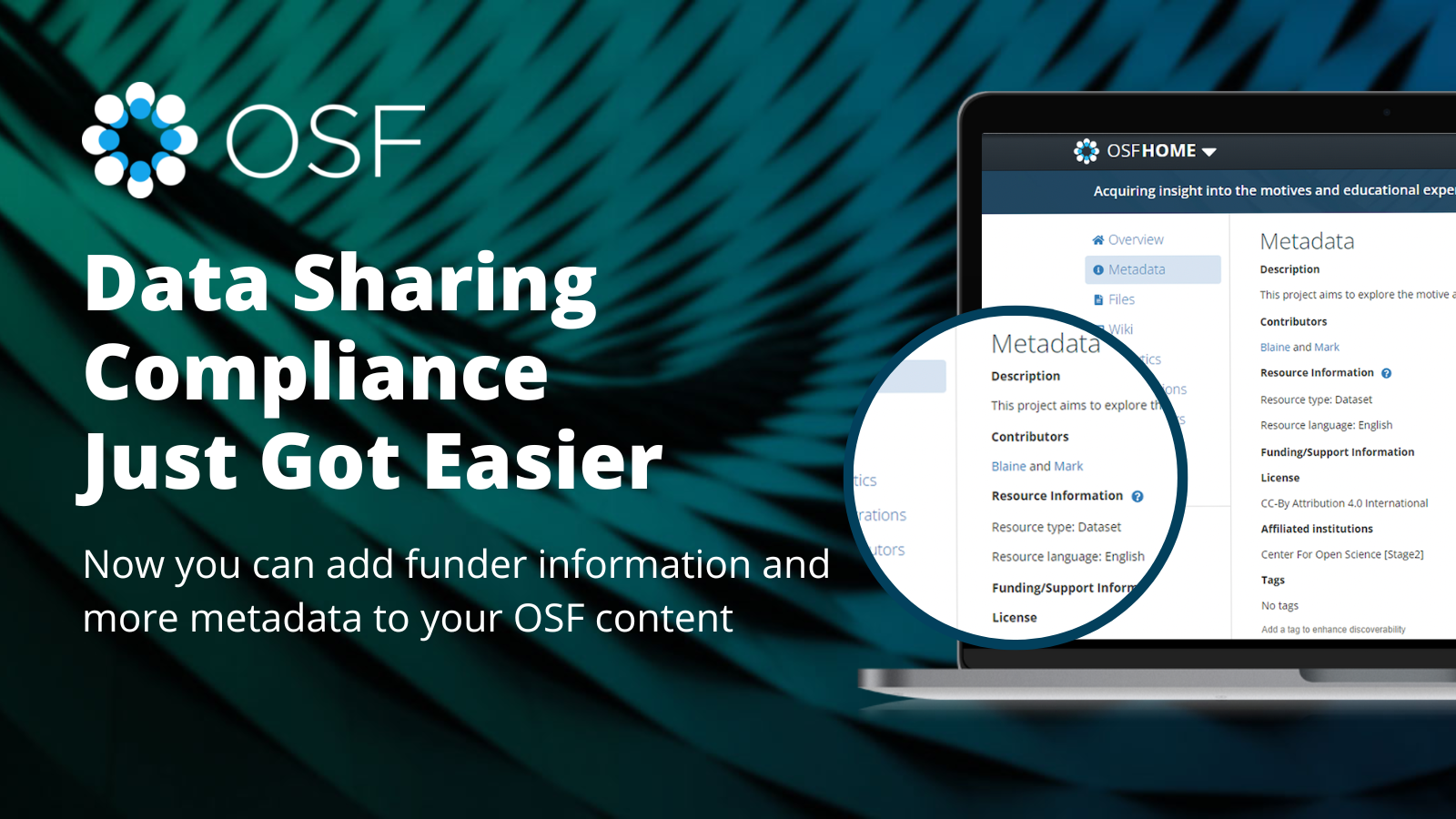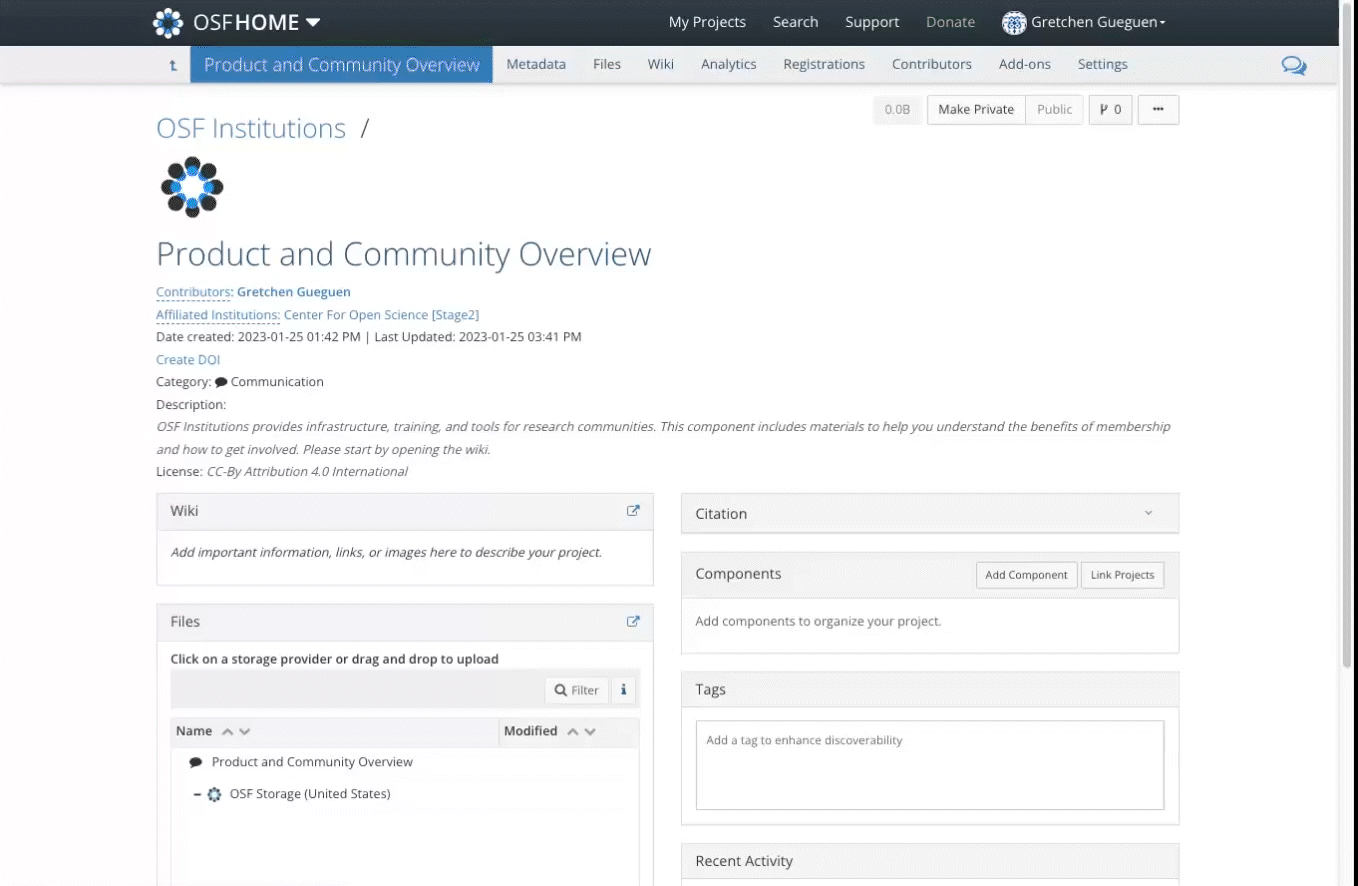
One of the most important features of OSF is something you may not even be aware of, yet you use it all the time: Metadata. All OSF Projects, Registrations, and Preprints come with associated metadata — information about the OSF object like the title, description, or keywords. Sometimes metadata is so integral to research we may not even notice it as a distinct element (as may be the case with a title, or with the date something is created). But without that title, or description, or keyword your research becomes hard to find and even harder to understand.
Researchers are now able to add information about the types of materials they are sharing on the OSF, as well as sources of funding or support. With an increasingly large number of resources online, whether on the OSF or not, this kind of information is crucial to enable organization, discovery, and reuse of your research outputs.
This metadata is so essential, in fact, that a number of new policies from major national, international, and other funding and research support agencies are requiring it. A new Data Sharing Policy from the NIH, that just went into effect on January 25th, calls for sharing of a set of common data elements, including the funder and resource type information that our recent changes support. In addition to specific guidelines like those, other agencies and institutions are supporting the creation of more mature infrastructure for data sharing. The recent policy from the White House Office of Science and Technology Policy, (which we wrote about last fall), and the UNESCO Recommendation on Open Science envision a research ecosystem that will need enhanced metadata to function.
Metadata is what allows research materials to be found, to be understood, and to be reused – and what ensures data and other research outputs are Findable, Accessible, Interoperable, and Reusable (FAIR).
Findable
While textual materials may be searchable, other materials are not so easily found. Metadata then becomes key to understanding and discovering resources in these formats. Even when text is present, metadata enhances and simplifies that information. It can state things that are not immediately observable like, for example, the length of a video, a subject or related field of study, or the name of a funder.
Accessible
Once found, research outputs need metadata to indicate how the resources can be accessed, and possibly authenticated and authorized. Metadata about the licensing of the resource, the language of the resource, and any restrictions in use are vital to sharing research.
Interoperable
Metadata enables research outputs to be integrated with other resources and systems. Indexing of OSF public content happens automatically in many cases, because OSF has a public API and registers persistent identifiers (PIDs) with both Datacite and Crossref. In addition to DOIs for your OSF projects, preprints, and registrations, OSF leverages identifiers for people (ORCID iDs), places (ROR IDs for OSF Institutions member affiliations and Crossref Funder IDs for funders), and things (associate DOIs for your data, publications, and materials with your OSF registrations and preprints). OSF content pages also use metatags to make it easy to be crawled by other services like Google Scholar and Dataset Discovery, Web of Science, and other tools to increase the discoverability and impact of research.
Reusable
To maximize the investment in research, metadata enables reusing research outputs by ensuring they are findable, interoperable, and understandable to be used to further advancement of knowledge and innovation. Metadata can tell others how the data or resource is structured, the language or ontology used within the resources, how it was collected or generated, and how it should be read or used. Without this vital information found in the metadata, research is only single use.
New FAIR metadata features in OSF will enable users to meet funder requirements as well as add more information about the nature of your research materials, making it easier for funders or collaborators to find, access, and build upon your work. These changes will add more richness to OSF’s searchable data while also meeting new and upcoming policy guidelines.
Metadata is already a part of the OSF. New metadata enhancements on OSF now enable research producers and consumers to store and share metadata in several key ways. To further enhance the FAIR-ness of OSF content, Metadata fields are being added for:
Complemented by our existing metadata for title, description, contributors, license, publication and modification dates.

In addition, fields for subjects or disciplines, which are currently only found on Registrations and Preprints, are being added to Projects in the coming weeks.
The other major change is that new metadata is available at the file level. For example, while you may want to describe the overall subject or funder of your work on the Project or Registration, you can now add information about materials types or language to specific files. This means that if you want to specifically find or share datasets, you can add that resource type to those specific files.

As a community-driven open-source tool, OSF strives to leverage other community-developed open standards and tools. The metadata on OSF is designed to support a growing number of community-developed metadata schemas and ontologies, but first we have implemented Datacite’s metadata schema. This makes OSF aligned with other generalist repositories, as part of our collaboration in the NIH’s Generalist Repository Ecosystem Initiative (GREI) to develop a common set of metadata. OSF continues to build upon critical scholarly community infrastructure like DOIs, ORCID iDs, ROR IDs, Funder IDs, and content and data discovery services to allow OSF content to be as FAIR as possible, from research plans all the way to outcome reports. COS is also proud to participate directly with metadata working groups and committees globally, including Datacite, Crossref, and the European Open Science Cloud (EOSC). And in time, more metadata schemas, ontologies, and standards can easily be integrated into the metadata workflows for OSF content. With plans to incorporate tools like CEDAR to support more domain-specific metadata, standards like CREDiT to align research practices with incentives, and hopefully one day with journals and other platforms to pull metadata across platforms to increase efficiency for researchers.
Future metadata work will include improving search and discovery in OSF, creating customized metadata templates with even more fields, and streamlining metadata creation workflows. You can get started complying with funder mandates and improving the findability of your own research right now by completing these new fields to your OSF Projects, Registrations, and Files. Check out our Help Guides that can walk you through the process to get started.
Interested in learning more? Register for a webinar happening on February 22, 2023 at 1:00 pm ET for an overview of the new features. You can also subscribe to the COS newsletter to learn about future metadata opportunities, and watch this space for future discussions on OSF metadata efforts.

6218 Georgia Avenue NW, Suite #1, Unit 3189
Washington, DC 20011
Email: contact@cos.io

Unless otherwise noted, this site is licensed under a Creative Commons Attribution 4.0 International (CC BY 4.0) License.
Responsible stewards of your support
COS has earned top recognition from Charity Navigator and Candid (formerly GuideStar) for our financial transparency and accountability to our mission. COS and the OSF were also awarded SOC2 accreditation in 2023 after an independent assessment of our security and procedures by the American Institute of CPAs (AICPA).
We invite all of our sponsors, partners, and members of the community to learn more about how our organization operates, our impact, our financial performance, and our nonprofit status.